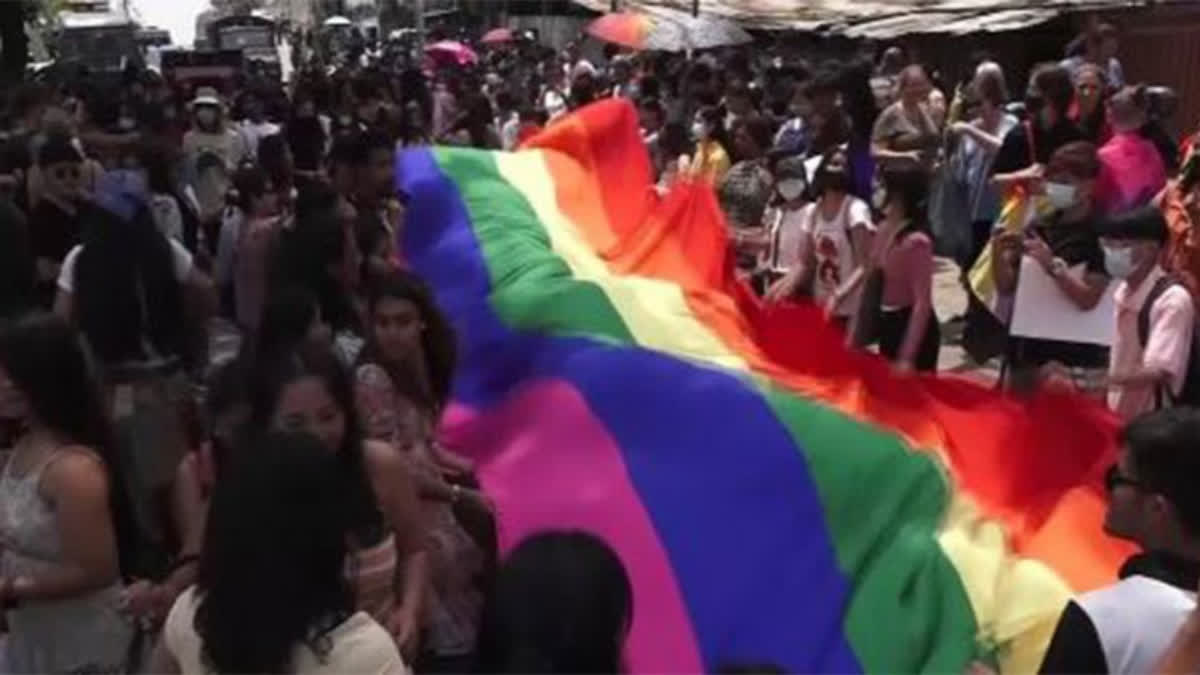New Delhi: In November this year, Nepal became the first country in South Asia and only the second in Asia after Taiwan to register a same-sex marriage. And now the Himalayan nation is set to organise the first-ever tourism conference for the LGBTIQ+ (lesbian, gay, bisexual, transgender, intersex, queer and others) community.
After the Supreme Court of Nepal ordered the government in June this year to establish a “separate register” for “sexual minorities and non-traditional couples” and to “temporarily register them”, Surendra Pandey, 27, of Kawasoti Municipality-8 in Nawalparasi East, and 37-year-old Ram Bahadur Gurung, who goes by the name Maya, of Dordi Rural Municipality-2 of Lamjung got their marriage registered at the Dordi Rural Municipality on November 29.
Even after the Supreme Court’s order in June, a district court in Kathmandu rejected the couple’s application to register their marriage in July. However, in the last week of November 2023, the Ministry of Home Affairs allowed local administration offices to begin registering same-sex marriages. As a result, Pandey and Gurung could finally get their marriage registered.
According to a report in The Kathmandu Post, the couple met nine years ago in Kawasoti. “We met in a restaurant and immediately liked each other. After a couple of weeks of courtship, we moved in together,” Maya was quoted as saying. “But our family and society did not accept us. We then moved to Kathmandu. Although we got married in a temple five years ago, our marriage was not legally recognised.”
According to Yuvaraj Adhikari, Chairman of the Dordi Rural Municipality, the marriage was registered at the ward office after the Department of National ID and Civil Registration instructed it to register the marriage in the temporary record “as per the Supreme Court’s interim order until the formulation of a law”.
According to Kyle Knight, Interim Deputy Director of the Lesbian, Gay Bisexual and Transgender Rights Programme at Human Rights Watch, marriage equality and other LGBT rights advances have a long history in Nepal. “In 2007, the Supreme Court ordered the government to form a committee to prepare a law legalising same-sex marriage,” Kyle writes in an article following the marriage of Pandey and Gurung.
“In 2015 that committee recommended the government ‘grant legal recognition to same-sex marriage based on the principle of equality’. However, successive governments failed to bring legislation, leading to further court rulings. In March, the court ordered the government to recognise the marriage of a same-sex couple, who had married in Germany.”
According to Knight, officials have upheld the rights of Maya Gurung and Surendra Pandey and “shown that it is possible for same-sex relationships to be recognised across the country”. “This is an example other officials should follow,” he writes.
And that is exactly how Nepal is advancing. In January 2024, Nepal will hold an international conference on LGBTIQ+ tourism. The two-day conference is being held after Nepal produced the first batch of guides in July this year trained to guide LGBTIQ+ trekkers. LGBTIQ+ tourism, also known as pink tourism, encompasses key elements such as destinations, accommodations, and travel services actively seeking to appeal to LGBTIQ+ travellers. This demographic includes individuals interested in visiting LGBTIQ+-friendly locations, those desiring to travel alongside fellow LGBTIQ+ companions regardless of the destination, and LGBTIQ+ travellers primarily focused on cultural and safety considerations. The colloquial term “gaycation” has evolved to signify a vacation with a distinct emphasis on LGBTIQ+ culture, either during the journey or at the chosen destination.
The LGBTIQ+ tourism industry comprises various entities, including destinations represented by tourism offices and convention and visitor bureaus (CVBs), travel agents, accommodations, hotel groups, tour companies, cruise lines, and advertising/promotion firms targeting the gay community. In response to the growing visibility of LGBT families in the 1990s, the 2000s witnessed a rise in family-friendly LGBTIQ+ tourism offerings.
According to travel industry news website Skift, prior to the outbreak of the COVID-19 pandemic, the global value of LGBTIQ+ travellers was worth an estimated $218 billion. Nepal’s economy suffered immensely due to the pandemic as tourism serves as a significant source of foreign exchange and revenue. The tourism industry contributes around 6.7 per cent to the Himalayan nation’s GDP. LGBTIQ+ activists now want Nepal to cash in on the lucrative pink tourism market.
“Nepal is considered a champion and beacon of hope for LGBTIQ+ rights in South Asia,” The Kathmandu Post quoted Sunil Babu Pant, the first openly gay former parliamentarian in Asia, as saying while briefing the media about the conference in Kathmandu that will begin on January 18. “Now, it needs to tap its potential business opportunities – pink tourism. We may invite prominent people from the LGBTIQ+ communities from around the world. The international participants may number just over 100. This is the beginning.”
Pant underscored the opportunity to draw in visitors and generate employment opportunities, particularly for individuals, who encounter difficulties securing jobs abroad because of their unique identity. Pant stressed the significance of exploring markets such as China and India, both of which have sizable LGBTIQ+ populations frequently confronted with social, cultural, and political discrimination.
Nepal’s remarkable journey towards becoming an LGBTIQ+-friendly haven is a testament to the nation’s commitment to inclusivity and acceptance. The country is emerging as not just a destination of breathtaking beauty but as a beacon of progress, inviting all to enjoy its hospitality, regardless of gender or sexual orientation.
Also read: Minor girl rescued, four human traffickers arrested by SSB at Indo-Nepal border in Bihar's Sitamarhi



